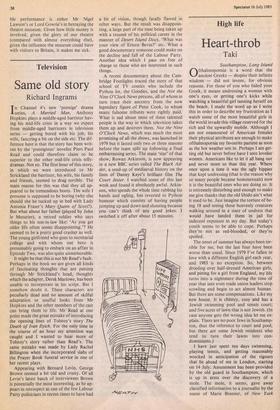Television
Same old story
Richard Ingrams
Tn Channel 4's new 'prestige' drama series, A Married Man, Anthony Hopkins plays a middle-aged barrister hav- ing his mid-life crisis in a way we expect from middle-aged barristers in television series — getting bored with his job, his wife, fancying a bit on the side etc. The dif- ference here is that the story has been writ- ten by the 'prestigious' novelist Piers Paul Read and could therefore claim to be superior to the other mid-life crisis telly- dramas. Not so. The first hour of this story, in which we were introduced to Mr Strickland the barrister, his wife, his family and friends, seemed to drag terribly. The main reason for this was that they all ap- peared to be tremendous bores. The wife I presume is supposed to be boring (why else should she be tucked up in bed with Lady Antonia Fraser's Mary Queen of Scots?). But what about her father (played by John le Mesurier), a retired soldier who says things to his son-in-law like: 'As you get older life often seems disappointing.'? He seemed to be a pretty good crasher as well. The young girlfriend who goes to secretarial college and with whom our hero is presumably going to embark on an affair in Episode Two, was also quite unmemorable. It might be that this is not Mr Read's fault. Perhaps in the book we are given all kinds of fascinating thoughts that are passing through Mr Strickland's head, thoughts which the adapter, Derek Marlowe, has been unable to incorporate in his script. But I somehow doubt it. These characters are peculiarly dead and no amount of skilful adaptation or soulful looks from Mr Hopkins and the other members of the cast can bring them to life. Mr Read at one point made the great mistake of introducing the opening lines of Tolstoy's story The Death of Ivan Ilyich. For the only time in the course of an hour my attention was caught and I wanted to hear more of Tolstoy's story rather than Read's. The same mistake was made by Lady Rachel Billington when she incorporated slabs of the Prayer Book funeral service in one of her recent plays. Appearing with Bernard Levin, George Brown seemed a bit old and crusty. Of all Levin's latest batch of interviewees Brown is potentially the most interesting, as he ap- pears in retrospect as one of the few Labour Party politicians in recent times to have had a bit of vision, though fatally flawed in other ways. But the result was disappoin- ting, a large part of the time being taken up with a resume of his political career in the manner of Desert Island Discs. 'What was your view of Ernest Bevinr etc. What a good documentary someone could make on the decline and fall of the Labour Party. Another idea which I pass on free of charge to those who are interested in such things. A recent documentary about the Cam- bridge Footlights traced the story of that school of TV comics who include the Python lot, the Goodies, and the Not the Nine O'Clock News persons, all of whom in turn trace their ancestry from the now legendary figure of Peter Cook, to whom many fulsome tributes were rightly paid. What is sad about most of these talented people is the way in which television takes them up and destroys them. Not the Nine O'Clock News, which was much the most promising of all the shows, was launched in 1979 but it lasted only two or three seasons before the team split up following a final embarrassing series. The main 'star' of that show, Rowan Atkinson, is now appearing in a new BBC series called The Black Ad- der, a send-up of mediaeval history on the lines of Danny Kaye's brilliant film The Court Jester. I watched some of this last week and found it absolutely awful. Atkin- son, who spends the whole time rubbing his hands and ogling, has reverted to Python humour which consists of having people jumping up and down and shouting because you can't think of any good jokes. I switched it off after about 15 minutes.






































 Previous page
Previous page